Just In
- 3 min ago

- 46 min ago

- 56 min ago

- 1 hr ago

Don't Miss
- Automobiles
 Brixton Motorcycles to Revolutionize Indian Two-Wheeler Scene with Market Entry
Brixton Motorcycles to Revolutionize Indian Two-Wheeler Scene with Market Entry - Movies
 MET Gala 2024: WHO Will Host The Exclusive Fashion Event THIS Year?
MET Gala 2024: WHO Will Host The Exclusive Fashion Event THIS Year? - Education
 MP Board 10th 12th Result 2024 will be OUT Today: Know steps to check the result
MP Board 10th 12th Result 2024 will be OUT Today: Know steps to check the result - Technology
 Here’s a List of Smartphones That Are Most Likely to Feature Qualcomm Snapdragon 8 Gen 4
Here’s a List of Smartphones That Are Most Likely to Feature Qualcomm Snapdragon 8 Gen 4 - Sports
 IPL 2024: No Place For Sanju Samson in Irfan Pathan's 15-Member Indian T20 World Cup Squad
IPL 2024: No Place For Sanju Samson in Irfan Pathan's 15-Member Indian T20 World Cup Squad - News
 ByteDance To Sell TikTok Or Face Ban In US: Senate Passes Bill
ByteDance To Sell TikTok Or Face Ban In US: Senate Passes Bill - Finance
 Okay Play India Posts 12.79% Revenue Growth In Q4 After 1:10 Stock Split Approval
Okay Play India Posts 12.79% Revenue Growth In Q4 After 1:10 Stock Split Approval - Travel
 Fly in Luxury: 10 Ways to Get Free Flight Upgrades
Fly in Luxury: 10 Ways to Get Free Flight Upgrades
19 Home Remedies To Ease Your Baby's Blocked Nose!
When it comes to our babies, we leave no stone unturned in ensuring that everything from A to Z is right and perfect. But little ones can still fall ill because of their fragile immune systems. One such problem your little one may suffer from is a runny nose. A blocked or a runny nose can be as much of an inconvenience to little babies as to adults. It is not just uncomfortable, but since babies don't have the ability to convey exactly what they're experiencing, it can indeed be very irritable for them, making them all-the-more grouchy. Moreover, it also affects your baby's feeding and sleeping patterns.
As parents, it sure is really difficult to see your bundle of joy in such a sad state. So, what is one to do before consulting the doctor? First off, realize that babies are fragile and hence, buying over-the-counter medicines without a prescription is a strict no-no. Secondly, stop worrying, because there are loads of effective home remedies that actually work for your baby. In this article, we've listed 19 effective home remedies for when your little one has a nasal congestion.

Symptoms Of Nasal Congestion
Following are some symptoms which will help you recognize nasal congestion in your baby quickly.
1.) Breathing noisily
2.) Snoring
3.) A runny nose
4.) Sneezing
5.) Nose-picking
But Why Do Babies Get Nasal Congestion?
There are many reasons why your baby may get a nasal congestion but at the head of it is the fact that babies have their biological systems in the developing stages, making them fragile and more vulnerable to diseases. 5 of the most common causes have been listed below.
1.) Common cold
Hands down this is the most common reason behind why a baby, or an adult for that matter, may suffer from a nasal congestion. Different types of viruses can cause a common cold which leads to the inflammation of the inner lining of the nose. As a result, more mucus is produced in order to tackle the attack, although it blocks the nose.
2.) Allergens and irritants
There is a countless number of allergens and irritants which can trigger a nasal congestion. For instance, if your child is allergic to pollen or other substances, coming in contact with the allergen is bound to cause inflammation in the nose, and therefore a runny nose due to excess amount of mucus secretion. To top it all, being exposed to dry air in such a condition would make the mucus hard and therefore cause breathing difficulty. It is also possible that the baby must have inserted something into the nose as a result of which the inflammation has occurred.
3.) Influenza
Common cold and Influenza symptoms are almost the same except that influenza causes more mucus secretions and more often than not is accompanied by a high fever. Influenza virus can affect not just the nose, but also the throat and the lungs, and hence is a more serious issue than a common cold.
4.) Polyps
Polyps are classified as growth anomalies or as extra-growth made of mucus. Though harmless, their position in the nasal cavity plays a role in whether or not your child will have a runny nose.
5.) Infections of the sinuses, tonsils and adenoids
While sinuses are air-filled sacs present in the nose, tonsils and adenoids are lymphatic tissues. During an infection due to external agents, the sinuses get filled with mucus and the tonsils and adenoids swell up as an immune response. This can also cause pretty uncomfortable nasal blockage and congestion in your baby.
19 Home Remedies To Help Relieve Your Baby Of The Nasal Congestion
Home remedies have been around forever. Even if it is as a preventive measure or to get relief from the actual disease, home remedies have been tried and tested and proven effective. Luckily, nasal congestion has a wide variety of home remedies that you can adopt safely for your baby.
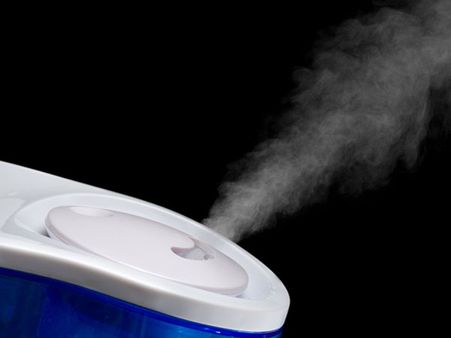
1.) Cool mist humidifier
The main aim of relieving discomfort during nasal congestion involves trying to clear the blocked or a runny nose first and foremost. Moisture is a beneficial agent that can help clear the congestion in the nasal cavity. Hence, creating a moisture-rich atmosphere for your baby would be of great help. For this purpose, you can use a cool-mist humidifier and place it in the baby's room. Alternatively, you can also choose to keep a bucket of warm water inside the room while your baby is asleep. Warm water also evaporates to bring about more or less the same effect that a humidifier does. Either way, the moisture formed will relieve the baby's nasal congestion.
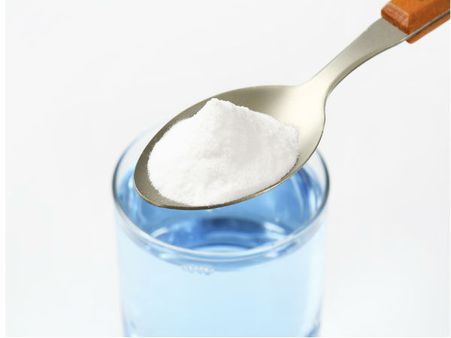
2.) Saline water
One of the best home remedies is using saline drops for the nasal cavity. Its antibacterial properties clear both - a blocked nose, as well as a runny nose - and also kill the bacteria which cause cough and cold. Saline drops can either be prepared at home easily or bought from the market. For this, you'll need to dissolve a quarter of a teaspoon of salt in 230 ml of warm water. Stir well and let it sit until it properly dissolves and is at the right temperature. Lay your baby on his or her back, pour two to three drops of the saline solution into their nose and wait for one minute. After this, make your baby lay on his or her stomach so as to drain out the mucus along with the saline water. Wipe off any excess mucus using a tissue.

3.) Breastmilk
Science has been emphasizing the benefits of breastmilk for a long time. In fact, it turns out to be better than a lot of medicines for babies. Rich in antibodies and nutrients, the breast milk not just helps in strengthening the baby's immune system, but it also can help your child with cough and cold. While your baby has a nasal congestion, breastmilk can help in two ways. First of all, the baby will not be able to latch on to you because of the congested nose, and hence, mothers can pour a drop or two of the breast milk into the baby's nasal cavity. After a minute, lift the baby's head up so that it can drain out along with the mucus. Secondly, since the baby will have trouble feeding during nasal congestion, you will have to feed him or her more frequently in order to keep the baby hydrated and healthy.

4.) Nasal aspirator
A nasal aspirator or a nasal suction bulb can be easily bought from the market and comes in different shapes and forms. Nasal aspirators are, in fact, very quick and effective, and use the method of suction to suck out the mucus from a runny nose. Most aspirators will have a bulbous portion and a narrow tip. Press and hold the bulbous portion, insert the tip of the aspirator into the baby's nose, and slowly release the bulbous portion. This will suck out the mucus into the aspirator. After use, make sure to wash the aspirator with warm water and keep it sterilized. Do not use your baby's aspirator on anybody else or any other baby.

5.) Warm juice
If your baby is over 6 months of age, feed him or her some warm and unsweetened juice. The warmth of the juice will help melt or thin the mucus at the back of the throat. Moreover, it will help keep the baby hydrated in case he or she isn't able to feed properly.

6.) Warm water, lemon and honey
Hydrating the baby's body is important at all times, especially when he or she has a cold, as it helps to thin and drain out the mucus. And what could be better than the combination of lemon, honey and water to do the same? Boil one cup of water and let it sit until it cools down. Pour the juice of half a lemon into it and mix it with a tablespoon of honey. Feed this solution to your baby in half-hour intervals.

7.) Mustard oil, garlic and fenugreek seeds
Did you know that massaging your baby can also help with cold and nasal congestion? Well, mustard oil is a great way to do just that. You can use a quarter cup of mustard oil mixed with a few garlic cloves and fenugreek (methi) seeds. Heat the mixture and let it cool. Use the mixture to massage your baby, especially on the chest and back. Be gentle while massaging. Any excess mixture can be stored away in a container.

8.) Chamomile tea
If your baby is over 6 months of age, then you can feed him or her chamomile tea so as to soothe the throat irritated with mucus. Chamomile tea has multiple benefits for your baby, including improving digestion, preventing infections and helping the baby sleep better.

9.) Remove hard mucus with warm water
A runny nose is a problem. But when the nose gets blocked with dry mucus, it is an even bigger discomfort for your child. Dip a gentle cotton swab in warm water and clean the areas around your baby's nose. Dip another ear-bud in warm water and use it to clean the insides of our baby's nose. Be very gentle while doing so, in order to avoid causing injury to the baby's nasal cavity.

10.) Pat the baby’s back
Gently patting on your baby's back can also help ease the chest and therefore the nasal congestion. The pats help in breaking the mucus so that the baby can cough it out. Lay your baby on your lap, cup your hands and gently pat your baby's back.
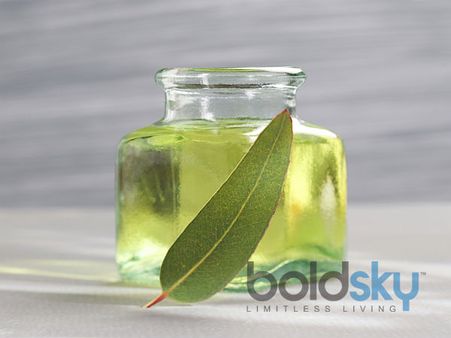
11.) Eucalyptus oil
Eucalyptus oil has been traditionally used to treat conditions of the chest, especially is symptoms like nasal congestion. The advantage of using this specific oil is that it will also help if your baby has a mild headache during the cold. But do not use the oil directly on your baby's body as its smell may be a little too much for your baby to handle. You can instead choose to sprinkle a few drops of it on your little one's bedding.

12.) Elevate the baby’s head with a pillow
When your baby is in the upright position, he or she will be more comfortable. But when the baby lies down, the mucus fills the nasal cavity, making it difficult for the baby to breathe. That's why, using a pillow to elevate your baby's head can help ease his or her discomfort and also to drain out the excess mucus.

13.) Vaporiser
A vaporizer also works like a cool-mist humidifier. It provides your baby's nose with moisture and thereby helps to clean out the mucus in the nose. There are chances that the vaporizer catches a mold growth, but you can clean it regularly to avoid that.

14.) Warm bath
A warm bath can be very soothing for everyone. So is the case with your baby. During a nasal congestion, a warm bath can provide your baby some-much needed relief by easing the chest, the nose, and also thinning and clearing the mucus.

15.) Steam room
Since our primary objective is to create moisture or steam to clear the mucus, sitting in a steam room with your baby can be good for your baby as well as you. While steam is an amazing decongestant, it also has incredible benefits for your skin. You can run a hot shower in the bathroom so as to create steam. Once your bathroom is steamed enough, you can sit in there with your baby, or better, breastfeed him or her.
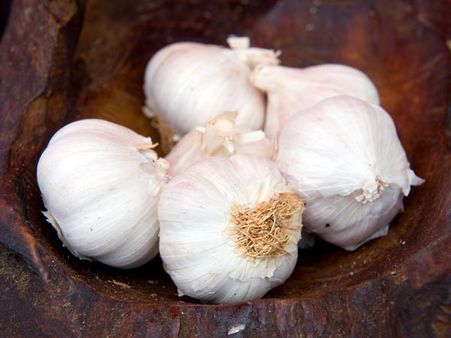
16.) Garlic and carom seed fumes
Garlic is a powerful natural treatment for a variety of conditions. Apart from mustard oil, garlic can also be used in other ways to rid your baby of his or her bad congestion. One method is to roast a few big cloves of garlic and a few pinches of carom seeds (Ajwain) together. Once it starts to fume, let it cool down and waft the fumes or smell towards your baby. Either that or you can put the mixture in a cloth or pouch and help the baby smell it. This combination works well to relieve most symptoms of cough and cold.
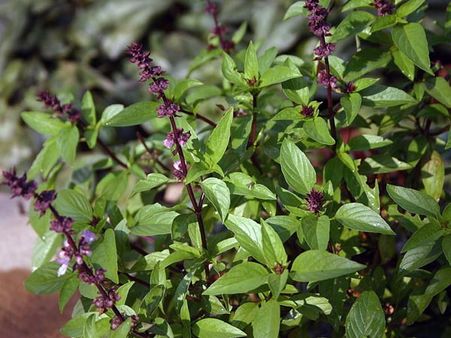
17.) Tulsi or basil water
Yet another amazing medicinal plant is the holy basil, better known as the Tulsi. The juice of the leaves is a potent agent which can fight infections and keep cough and cold at bay. To use Tulsi for your baby, boil a few leaves of tulsi in water and let it cool down. You can either feed the mixture directly to your baby or you can mix one or two spoons of it with the baby's milk and feed that way.
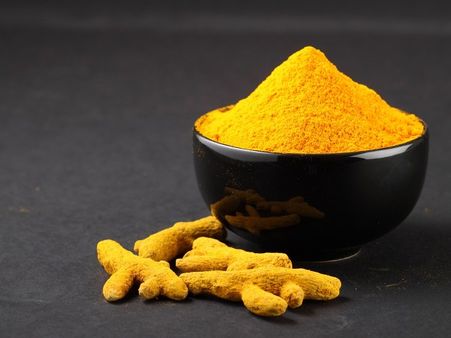
18.) Dry-roasted turmeric rub
If there's an all-purpose spice in our kitchen, it is turmeric. It relieves the body of cough, cold, infections, fever, and what not. But when it comes to your baby, you should prefer not to use commercially bought turmeric. Instead, you can make turmeric powder at home. You can make use of dried turmeric roots to make turmeric powder - just burn the roots and then powder them. Add a few drops of water or milk to the powder, mix it into a smooth paste and use it on the baby's nose. This will help alleviate the discomfort caused by the blocked nose.

19.) Essential oils
It is for good reason that essential oils are named so. Essential oils are basically extracts of different parts of plants. But they are different from the commercially available fragrance oils. Essential oils are therapeutic and help with different types of diseases, including cough and cold. You can make use of an essential oil diffuser so that the oil can better diffuse in your baby's environment. Some of the most effective essential oils used for nasal decongestion are cedarwood oil, rosemary, clove, thyme, etc.
When Should You Consult The Doctor?
If your baby's cold hasn't subsided even after 3 weeks, schedule an appointment with your doctor. If your 3- to 6-month old baby has a high fever, you must visit your doctor asap. In addition to that, if your baby is constantly coughing and has a sore throat that doesn't seem to leave, you should visit your doctor to get checked. Home remedies can be used to ease discomfort and symptoms, although persistent symptoms may mean that your baby needs medical attention.
-
 yoga spiritualityEid Ul Fitr 2024: 50 Modern Muslim Baby Boy Names Born On Eid With Meaning
yoga spiritualityEid Ul Fitr 2024: 50 Modern Muslim Baby Boy Names Born On Eid With Meaning -
 healthIn China, Infant Is Born With Four-Inch Tail Growing from Its Buttocks, Know The Reason Behind This
healthIn China, Infant Is Born With Four-Inch Tail Growing from Its Buttocks, Know The Reason Behind This -
 fashionRaha Kapoor Twins With Mommy Alia Bhatt At Ambani Pre-Wedding Bash, 7 Tips To Match Outfits With Your Baby
fashionRaha Kapoor Twins With Mommy Alia Bhatt At Ambani Pre-Wedding Bash, 7 Tips To Match Outfits With Your Baby -
 beautyFrom Pigtails To Messy Curls, 7 Trendy Hairstyles Generated By AI For Your Little Fashionista
beautyFrom Pigtails To Messy Curls, 7 Trendy Hairstyles Generated By AI For Your Little Fashionista -
 healthExclusive: Doctor Shares How There Is Rise Of Muhurat Deliveries Aligned With Ram Mandir Consecration
healthExclusive: Doctor Shares How There Is Rise Of Muhurat Deliveries Aligned With Ram Mandir Consecration -
 fashionNew Born Baby Photoshoot Ideas Interpreted By AI, 7 Tips To Make This Cute Session Memorable
fashionNew Born Baby Photoshoot Ideas Interpreted By AI, 7 Tips To Make This Cute Session Memorable -
 fashionYear Ender 2023: Baby Clothing Trends That Will Dominate The Little One's Wardrobe In 2024
fashionYear Ender 2023: Baby Clothing Trends That Will Dominate The Little One's Wardrobe In 2024 -
 insync50 Lord Krishna Names For Baby Boy That Will Bless Your Child With Divine Qualities
insync50 Lord Krishna Names For Baby Boy That Will Bless Your Child With Divine Qualities -
 pregnancy parentingTwo Wombs, Four Hearts: US Mom's Extraordinary Double Uterus Pregnancy
pregnancy parentingTwo Wombs, Four Hearts: US Mom's Extraordinary Double Uterus Pregnancy -
 pregnancy parentingDelhi Air Pollution: Pregnant Women Must Follow These 4 Things!
pregnancy parentingDelhi Air Pollution: Pregnant Women Must Follow These 4 Things! -
 home n gardenHappy Birthday Raha Kapoor: From Customized Wall Art To Figurine Hooks, 8 Ideas To Decorate Your Baby's Room
home n gardenHappy Birthday Raha Kapoor: From Customized Wall Art To Figurine Hooks, 8 Ideas To Decorate Your Baby's Room -
 pregnancy parentingExpert Opinion On Breastfeeding: How It Will Help Baby And Mother
pregnancy parentingExpert Opinion On Breastfeeding: How It Will Help Baby And Mother


 Click it and Unblock the Notifications
Click it and Unblock the Notifications



